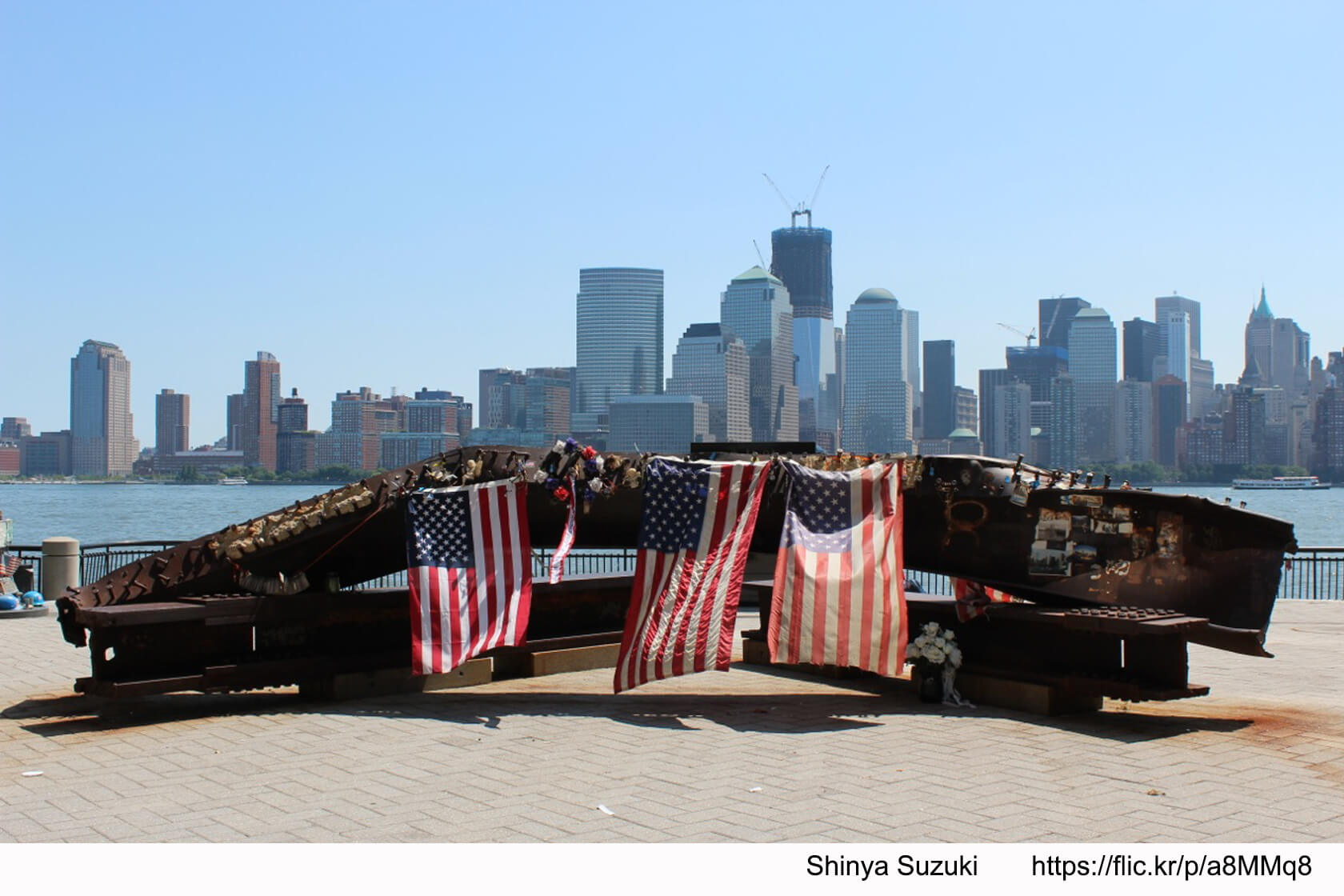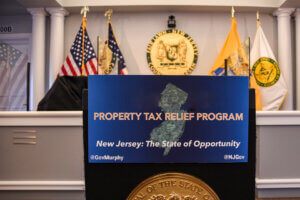West Long Branch, NJ – Twenty years after the region was shaken by the horrific events of September 11th, New Jersey voters see domestic terrorism as a greater threat than foreign terrorism by a more than 4 to 1 margin. The Monmouth (“Mon-muth”) University Poll finds more voters see the country as a whole – and New York City specifically – as being more safe rather than less safe from terrorism than it was in 2001, but the gap has narrowed over the past decade. Nearly 1 in 5 Garden State voters still think about that fateful day on a regular basis.
Just under 4 in 10 New Jersey voters (38%) feel the country is more safe from terrorism now than it was before the 9/11 attacks, while 28% say it is less safe. Ten years ago, a slightly larger number of voters (45%) felt the country was more safe and a slightly smaller number (20%) said it was less safe. The past decade’s decline in feeling the country is more safe has been greater among Republicans (from 50% to 35%) than among Democrats (from 49% to 43%) or independents (from 39% to 36%).
Overall, though, Garden State voters are much more likely to see domestic terror groups (67%) as a bigger threat to the country than foreign terror groups (16%). Majorities of Democrats (80%), independents (66%), and Republicans (51%) see domestic terrorism as a relatively greater threat.
“We don’t have trend numbers on this particular question, but it is likely that events of the last few years, including the attack on the U.S. Capitol in January, have focused terrorism concerns on threats emerging from within our borders,” said Patrick Murray, director of the independent Monmouth University Polling Institute.
The poll was conducted just before the U.S. withdrawal from Afghanistan and it is not clear whether this development has a significant impact on public opinion about these questions.
The poll also finds that nearly 1 in 5 New Jersey voters (18%) still think about what happened on September 11th, 2001 on a regular basis. Just over 1 in 4 (27%) say they rarely or never think about the attacks. Ten years ago, 31% of voters regularly thought about 9/11 and 23% did so rarely or never. Currently, 56% think about it from time to time (46% in 2011). The number who think about the attacks on a regular basis has declined among all demographic groups and regions of the state.
“The memory may be fading, but not entirely. The 9/11 attacks left an indelible imprint on the Garden State that will never entirely disappear,” said Murray.
One in five Garden State voters plan to do something to mark the 20th anniversary of the attacks, including 7% who will attend a public ceremony and 12% who plan a private observance. Ten years ago, 13% planned to attend a public ceremony and 13% planned a private observance.
A persistent policy issue related to 9/11 revolves around rescuers who have since developed health issues. Only 14% of New Jersey voters say that the government has done enough for these responders compared to 49% who say the government has not done enough to meet their health care needs. Another 37% have no opinion on this. Ten years ago, a much larger two-thirds of voters (68%) said the government was not doing enough. This shift has been offset more by an increase in the number of voters who have no opinion (23% in 2011) than by an increase in those who think the government has done enough (9% in 2011).
The poll findings about the relative safety of New York City twenty years after 9/11 are similar to opinion about the country as a whole. Specifically, 37% of New Jersey voters say the city is more safe from terrorism now than before 9/11 (versus 48% in 2011) and 27% say it is less safe (14% in 2011).
The Monmouth University Poll was conducted by telephone from August 11 to 16, 2021 with 810 New Jersey registered voters. The question results in this release have a margin of error of +/- 3.5 percentage points. The poll was conducted by the Monmouth University Polling Institute in West Long Branch, NJ.
QUESTIONS AND RESULTS
(* Some columns may not add to 100% due to rounding.)
[Q1-27 previously released.]
28.Were you already aware that the 20th anniversary of the September 11th terrorist attacks is coming up this year, or hadn’t you realized this yet?
| TREND: REGISTERED VOTERS | Aug. 2021 | Aug. 2011* |
| Already aware | 80% | 87% |
| Hadn’t realized | 20% | 13% |
| (n) | (810) | (730) |
*Aug. 2011 asked about the 10th anniversary of the attacks.
29.Do you still think about the September 11th attacks on a regular basis, just from time to time, very rarely, or never?
| TREND: REGISTERED VOTERS | Aug. 2021 | Aug. 2011 |
| Regular basis | 18% | 31% |
| Just from time to time | 56% | 46% |
| Very rarely | 21% | 18% |
| Never | 6% | 5% |
| (VOL) Don’t know | 1% | 1% |
| (n) | (810) | (730) |
30.Do you plan to do something special to observe the 20th anniversary of the attacks, or nothing out of the ordinary? [If YES: Will you attend a public ceremony or observe it in private?]
| TREND: REGISTERED VOTERS | Aug. 2021 | Aug. 2011* |
| Public ceremony | 7% | 13% |
| Observe in private | 12% | 13% |
| Nothing out of the ordinary | 78% | 71% |
| (VOL) Don’t know | 4% | 4% |
| (n) | (810) | (730) |
*Aug. 2011 asked about the 10th anniversary of the attacks.
31.Some rescuers who responded to the attacks have since developed health conditions. Based on what you may have heard, has the government done enough or not enough to take care of their health needs, or don’t you have an opinion on this?
| TREND: REGISTERED VOTERS | Aug. 2021 | Aug. 2011 |
| Enough | 14% | 9% |
| Not enough | 49% | 68% |
| No opinion | 37% | 23% |
| (n) | (810) | (730) |
32.Compared to before the September 11th attacks, do you think the country as a whole is now more safe or less safe from terrorism, or has there been no change?
| TREND: REGISTERED VOTERS | Aug. 2021 | Aug. 2011 |
| More safe | 38% | 45% |
| Less safe | 28% | 20% |
| No change | 28% | 35% |
| (VOL) Don’t know | 6% | 1% |
| (n) | (810) | (730) |
33.And do you think New York City is now more safe or less safe from terrorism, or has there been no change?
| TREND: REGISTERED VOTERS | Aug. 2021 | Aug. 2011 |
| More safe | 37% | 48% |
| Less safe | 27% | 14% |
| No change | 29% | 36% |
| (VOL) Don’t know | 7% | 2% |
| (n) | (810) | (730) |
34.What do you think is a bigger threat to the country today – violence caused by foreign terror groups or violence caused by domestic terror groups? [CHOICES WERE ROTATED]
| REGISTERED VOTERS | Aug. 2021 |
| Foreign terror groups | 16% |
| Domestic terror groups | 67% |
| (VOL) Both equally | 9% |
| (VOL) Don’t know | 7% |
| (n) | (810) |
METHODOLOGY
The Monmouth University Poll was sponsored and conducted by the Monmouth University Polling Institute from August 11 to 16, 2021 with a statewide random sample of 810 New Jersey voters drawn from a list of registered voters. This includes 227 contacted by a live interviewer on a landline telephone and 583 contacted by a live interviewer on a cell phone, in English. Monmouth is responsible for all aspects of the survey design, data weighting and analysis. The full sample is weighted for party registration, age, gender, race, education, and region based on state voter registration list information and U.S. Census information (CPS 2018 supplement). Data collection support provided by Braun Research (field) and Aristotle (voter sample). For results based on the full voter sample, one can say with 95% confidence that the error attributable to sampling has a maximum margin of plus or minus 3.5 percentage points (unadjusted for sample design). Sampling error can be larger for sub-groups (see table below). In addition to sampling error, one should bear in mind that question wording and practical difficulties in conducting surveys can introduce error or bias into the findings of opinion polls.
DEMOGRAPHICS (weighted) |
| REGISTERED VOTERS |
| Self-Reported Party |
| 21% Republican |
| 43% Independent |
| 36% Democrat |
| 49% Male |
| 51% Female |
| 23% 18-34 |
| 30% 35-54 |
| 47% 55+ |
| 64% White, non-Hispanic |
| 13% Black |
| 14% Hispanic |
| 8% Asian/Other |
| 56% No degree |
| 44% 4 year degree |
Click on pdf file link below for full methodology and crosstabs by key demographic groups.




